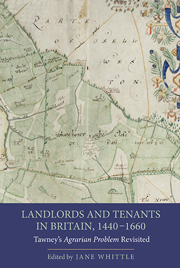Book contents
- Frontmatter
- Contents
- List of Figures
- List of Tables
- Abbreviations
- List of Contributors
- Acknowledgements
- Foreword
- Introduction: Tawney's Agrarian Problem Revisited
- 1 The Agrarian Problem, 1440–1520
- 2 Common Law and Manor Courts: Lords, Copyholders and Doing Justice in Early Tudor England
- 3 Negotiating Enclosure in Sixteenth-Century Yorkshire: The South Cave Dispute, 1530–1536
- 4 The Politics of Enclosure in Elizabethan England: Contesting ‘Neighbourship’ in Chinley (Derbyshire)
- 5 The Loss of Athelstan's Gift: The Politics of Popular Memory in Malmesbury, 1607–1633
- 6 In Search of the Scottish Agrarian Problem
- 7 The Transfer to Leasehold on Durham Cathedral Estate, 1541–1626
- 8 The Financial Rewards of Winning the Battle for Secure Customary Tenure
- 9 Risks and Rewards in Wasteland Enclosure: Lowland Lancashire c.1500–1650
- 10 Improving Landlords or Villains of the Piece? A Case Study of Early Seventeenth-Century Norfolk
- 11 The Agrarian Problem in Revolutionary England
- 12 Agrarian Capitalism and Merchant Capitalism: Tawney, Dobb, Brenner and Beyond
- Conclusions
- Select Bibliography
- Index
Foreword
Published online by Cambridge University Press: 05 September 2013
- Frontmatter
- Contents
- List of Figures
- List of Tables
- Abbreviations
- List of Contributors
- Acknowledgements
- Foreword
- Introduction: Tawney's Agrarian Problem Revisited
- 1 The Agrarian Problem, 1440–1520
- 2 Common Law and Manor Courts: Lords, Copyholders and Doing Justice in Early Tudor England
- 3 Negotiating Enclosure in Sixteenth-Century Yorkshire: The South Cave Dispute, 1530–1536
- 4 The Politics of Enclosure in Elizabethan England: Contesting ‘Neighbourship’ in Chinley (Derbyshire)
- 5 The Loss of Athelstan's Gift: The Politics of Popular Memory in Malmesbury, 1607–1633
- 6 In Search of the Scottish Agrarian Problem
- 7 The Transfer to Leasehold on Durham Cathedral Estate, 1541–1626
- 8 The Financial Rewards of Winning the Battle for Secure Customary Tenure
- 9 Risks and Rewards in Wasteland Enclosure: Lowland Lancashire c.1500–1650
- 10 Improving Landlords or Villains of the Piece? A Case Study of Early Seventeenth-Century Norfolk
- 11 The Agrarian Problem in Revolutionary England
- 12 Agrarian Capitalism and Merchant Capitalism: Tawney, Dobb, Brenner and Beyond
- Conclusions
- Select Bibliography
- Index
Summary
Early in my undergraduate career, my Cambridge supervisor in Economic History set two of us an essay on the agrarian problem of the sixteenth century: ‘was it less a problem of enclosures than of rents?’ (a good question). In trying to answer it we were not required to read Tawney's great book. We read about Tawney; not Tawney himself. That did not matter, because we were advised that Tawney was ‘an old sentimentalist’ who had failed to recognise that England was already a ruthless and competitive contract society in the sixteenth century, a society of which our supervisor clearly approved. Much later, I learned from another Cambridge economic historian that the trouble with Tawney was that, along with other ‘reformist’ economic historians, he suffered from ‘middle-class guilt’. Worse, he wrote ‘Mandarin’ prose.
When I actually read Tawney's Agrarian Problem for myself, shamefully late, I expected to find it a work with which I would have some sympathy, but which would inevitably be dated in both content and style. What a surprise, then, to find that Tawney's tone was predominantly cool, authoritative, and not at all sentimental; I thought him rather tough-minded. His purplish passages were justified in context and seemed to spring from indignation rather than guilt. His dominant manner was a sustained effort to explain, in a multi-faceted and at times distinctly distanced way, a set of profound and complex changes. If his sympathies were clearly with the losers in that process, he did not wallow in the celebration of victimhood.
- Type
- Chapter
- Information
- Landlords and Tenants in Britain, 1440-1660Tawney's 'Agrarian Problem' Revisited, pp. xiii - xviPublisher: Boydell & BrewerPrint publication year: 2013



